Sam Maguire
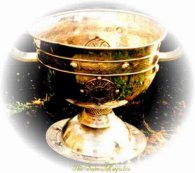 Samuel Maguire was born in 1877, in the town land of Mallabraca near the town of Dunmanway in West Cork. He came from a well-respected family who had lived in Mallabraca for the best part of 200 years. The Maguires farmed a large farm by West Cork standards. The farm consisted of the whole town land of about 200 acres (of which only 50 or 60 acres were good, farmland). They were an honest hard-working family who were very much at one with their Catholic neighbours. They were a Church of Ireland family but mixed with everyone Protestant and Catholic alike. Though relatively wealthy they were not full of themselves and would go out of their way to help their neighbours no matter what religion.
Samuel Maguire was born in 1877, in the town land of Mallabraca near the town of Dunmanway in West Cork. He came from a well-respected family who had lived in Mallabraca for the best part of 200 years. The Maguires farmed a large farm by West Cork standards. The farm consisted of the whole town land of about 200 acres (of which only 50 or 60 acres were good, farmland). They were an honest hard-working family who were very much at one with their Catholic neighbours. They were a Church of Ireland family but mixed with everyone Protestant and Catholic alike. Though relatively wealthy they were not full of themselves and would go out of their way to help their neighbours no matter what religion.
Sam himself grew in adulthood to be a tall, slim, broad shouldered man of a gentle nature. Sam had four brothers and two sisters. Willie was the eldest then Mary, Jack, Dick, Paul, Sam and Elizabeth. Willie never married and stayed at home to farm the land. Mary known locally as Moll also did not marry and stayed at home and so did Elizabeth. However, Jack and Dick both went to England and worked in London with Sam. Paul on the other hand married a local girl by the name of Hurley from Inchareagh north of the town. However she was a Catholic and so they emigrated to America. In the early 1970's their son a Catholic priest visited the old homestead. Sam was educated in the Model School in Dunmanway and afterwards the National School in Ardfield, which Michael Collins later attended. Here the local School Master Mr. Madden prepared the boys for the British Civil Service examinations. At the age of 20 Sam successfully passed the exams, as he was an excellent, student, and then he got a job in the London Post Office.
The house itself is situated just off the main road to Inchigeela and Macroom, four miles to the north of the town of Dunmanway. The house is now derelict without a roof and with crumbling walls. It is surrounded by evergreens mainly spruce and fir planted by the Forestry Department since it took over the surrounding acres. The valley is surrounded to the west by Nowen Hill, to the south by the Yew Tree Hill and by the Shehy mountains looming to the north. Sadly, today only a mere shell exists.
Most people, who have heard of Sam Maguire did so because they have heard of the Sam Maguire Cup. But who was the man? Why does the G.A.A. have a cup named after, him? This is not just a minor cup but the All Ireland Senior Football Cup. Maguire never won an All-Ireland medal, never was a president of the G.A.A., so why was this most prestigious cup named after Sam Maguire? Well when Sam Maguire went to London to work in the British Civil Service he joined London Hibernians He had never played in Ireland but probably was influenced by the fact that his local team (The Dohenys) at home in Dunmanway reached the All-Ireland football final in 1897. At this time the All-Ireland final was contested by the clubs who won their county championships and the London champions got a bye into the finals. Hence there was a "home final' and an "All-Ireland Final".
From here on the sources differ as to the years Sam Maguire played in the All-Ireland finals. However, G.A-A. records state that it was in 1900, 1901 and in 1903 that he captained the London Hibernians. On the latter two occasions however, many sources state that Maguire also played in 1902. This may be explained by the fact that at the time it was traditional for championships to run well behind schedule so the 1900 Final was actually played on Thursday, October 26, 1902. They played the Clonmel Shamrocks of Tipperary who won 3-7 to 0-2. In the 1901 Final which Maguire captained, they lost to the Isle of the Sea, Dublin 0-14 to 0-2. In 1902 the London Hibernians were again in the Final and again lost to Dublin, but Sam was not playing. In 1903, Sam was captain again. This time their opponents were Tralee Mitchels from Kerry and they again lost 0-11 to 0-3. On all four of these teams there was listed a J. Maguire who most probably was Sam's brother, Jack and as there did not seem to be a captain to the 1902 match presumably Sam must have been injured. This was, by no means, the end of his football career because in June 1906 he again captained the side in the final of the Croke Cup. Some sources claim it was an All-Ireland however, this is untrue as the All-Ireland records do not show this. One source claims he won this match and yet another says he lost it, but it is agreed that it was the last time he played in Jones's Road (Croke Park) and on an Irish pitch. However, some sources claim he then retired but more say that he played and captained the Hibernian team to the London Championship in 1908.
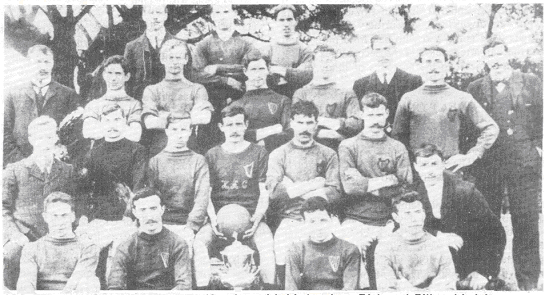
1908 Hibernians Senior Football Team.
In the centre with
the ball is Sam Maguire, with his brothers Dick and Bill to his left.
In 1907 Sam went into the administration of the London G-A-A., he became the Chairman of the London County, Board and a regular delegate to the Annual Congress of the G.A.A. He finally became a trustee of Croke Park. Coincidentally, Vice-Chairman of the London County Board was Liam McCarthy born in London in 1851 of a Cork father and a Limerick mother, who also worked in the London Post Office. Liam McCarthy's name is commemorated on the All-Ireland Hurling Cup.
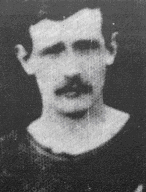
Sam Maguire now turned his attention to the IR.B. Here he undertook what must have been the most important step in Irish history since Parnell joined the Home Rule Party. In November 1909 at Barnsbury Hall Islington, Sam Maguire swore into the I.R.B. the young Post Office worker from Clonakilty. This young worker went to Ardfield School (Maguire also studied in Ardfield for the Civil Service) and Collins later became one of the most of the important men in Irish history.
Maguire was a great leader and soon rose to the rank of Lieutenant-General of the I.R.B. and Director of Intelligence in Britain. Michael Collins often called Maguire jokingly "You bloody South of Ireland Protestant" but in reality they were close friends and later when Collins was head of the I.R.B., Maguire was one of his Chief Intelligence Officers. Many times Maguire travelled across on the night mail to Dublin at weekends with information that he dare not write down. He was also believed not to have accepted any money for the expenses but paid for them himself.
Sam Maguire did not fight in the Rising of Easter of 1916 even though he would have liked to have done so. He believed that his job in the Civil Service was very important for the Cause and the best way to serve this was to remain there "as Governments carry on by post". This position gave him access to a lot of important information. His main function was to intercept Official State Documents relevant to British Military and Political intentions in Ireland. Maguire would pick out any suitable Irish men, who worked in the Post Office, and swore them into the I.R.B. and then set them to work on the mail.
Another important part of Maguire's work was to smuggle arms. Collins started to organise a Network which was later to work so well in the War of Independence. Collins' main agent in London was of course Sam Maguire. One incident occurred in the Post Office where Maguire worked. Sam was supposed to have approached an Official about some post office rifles which were stored in the corner of a room and suggested they should move them because "the unscrupulous Sinn Feiners were known to be active". However, the Officials did not heed this advice and two nights later the rifles were moved - to Dublin!
Sam Maguire was also involved in many plans to disrupt British daily life. Early in 1921 three top men were sent to London to liaise with Maguire and Reggie Dunne. They were George Fitzgerald, Sean Flood and Frank Thornton. There were some 25 M.P.s picked out for kidnapping and to be held in retaliation for hostages taken in Ireland. However, these plans never came to anything.
Again however in March 1921, Collins sent a hit squad to kill Major Percival of the Essex Regiment stationed in Bandon near Cork city. When Collins was unable to kill Percival in Cork, the hit squad followed Percival to England where he went on holidays later on in March. On March 16, he arrived at Liverpool station at 3 pm. However, the squad had to pull out a few minutes before when Maguire warned them that Scotland Yard was on their way.
On June 22, 1922, Sir Henry Wilson was shot dead outside his home in Belgravia. Sir Henry had been a Field Marshal in the army. He had retired and become a Unionist M.P. for North Down. He had also been appointed, Official Adviser to the Northern Minister of Home Affairs. He had organised and controlled the Special Constabulary. He was shot by Joe O'Sullivan and Reggie Dunne, second in command to Maguire of the London Intelligence. O'Sullivan had only one leg, as he had lost the other one in Ypres in World War 1, but he was Dunne's right hand man. This shows what the split over the Treaty had done to the London I.R.B. Dunne could have escaped but chose to stay with O'Sullivan and they both were captured and beaten by an angry crowd. In 1953, Joe Dolan of Collins's old intelligence group stated that Collins had given Maguire the order who in turn gave Reggie Dunne and O’Sullivan the order to assassinate Sir Henry Wilson. However, there is no other proof to back up Dolan's statement.
In November 1921 Cathal Brugha sent two men to London, Michael Hogan and Ned Lynch who were supposed to get some arms. They were told by Brugha to stay away from Collins and Maguire, showing the split in the I.R.B. before the Treaty was signed.
Why Maguire left London is somewhat unclear. Some sources state that British intelligence was becoming suspicious and started inquires into this mysterious "S.M.". This was after the assassination of Sir Henry Wilson. Soon Maguire was tipped off that Scotland Yard was about to close in on him so he left England and returned to Dublin in 1921 as one source states and in 1923 as others do . Some sources also state that he did not get cleanly away from London but served a prison sentence and lost his job in the Civil Service. However, he did get a job in the newly established Irish Civil Service.
Maguire was against the Civil War and was 011 the pro-treaty side, because of Michael Collins. However, in the new Civil Service, Maguire soon clashed with the pro-British staff that remained. Maguire wanted to work in a more Irish way and not the old British way so he was caught in the political vortex after the Treaty. This caused him to clash with his superiors and lead to his dismissal from Office.
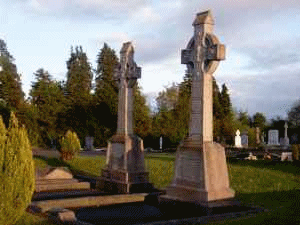
Maguire had become a regular at Croke Park in these days but now he returned to Mallabraca because of failing health. Sam Maguire died of tuberculosis on February 6, 1927, at the age of48. It is said on his final visit to Dunmanway he gave away his last £5 and said he would not need it anymore. A Celtic cross was raised over his grave with a simple inscription "erected to the memory of Samuel Maguire, Mallabraca who died 6 February 1927, By the people of Dunmanway and his numerous friends throughout Ireland and England in recognition of his love for his country. Ar dheis Dé go raibh a anam.” He is buried in the Protestant cemetery of St. Mary's, Dunmanway. The cross was damaged in a storm in 1960 but was replaced later by the G.A.A. It is an exact replica.
Although Michael Cusack tried to get more Protestants to join the G.A.A., very few ever played Gaelic Games and none held high office in the G.A.A.. So then how come one of the G.A.A.'s most prestigious trophies in named after a Protestant man? In 1928, shortly after Sam Maguire's death a group of his friends formed a committee in Dublin to raise funds for a permanent commemoration of his name. They decided on a cup to be presented to the G.A.A.. The G.A.A. were proud to accept it as Maguire was very important in the War of Independence and he was the only Protestant to captain a team in the Senior Football Final . The cup cost £300 in those days (equivalent to £20,000 today) was modelled on the Ardagh Chalice and made by Hopkins and Hopkins of O'Connell Bridge. However, the cup has so many errors its inscription that in the words of a G.A.A. source it is "almost unbelievable". Kildare was the first county to win the cup in 1928 after defeating Cavan 2-6 to 2-5 and Meath are the last county to have their name inscribed on the original cup after beating Cork in 1991.
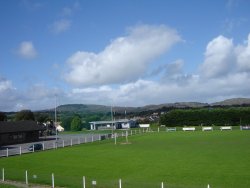
In 1938 the local people of Dunmanway decided to buy a park where Gaelic games could be played and named it after Sam Maguire. It took until 1959 to raise the money to buy the pitch and again until 1970 before the gates and dressing rooms were built, and on April 21, 1974, the Sam Maguire Park wes officially opened by Dr. D. Keenan the then President of the G.A.A.. However, it seems Sam Maguire did not die a hero, at home in Dunmanway. He did not return to the wealthy farm, which he had left, but to a poor one. He died in obscurity there in 1927 and few people knew how great a man he was and what he had sacrificed for his country. As time passed by less and less was known about Sam Maguire. Few people know anything about him now and if they do it is only about the Cup. Maybe the cup has done more harm than good so that it is only his football side that is remembered and not his more important I.R-B. role in the War of Independence. Yet maybe if the cup was not there in his memory it is very likely that nobody today would know about him, so that he would have slipped into oblivion. As one source puts it "we may have great men but we will never have better than Sam Maguire".
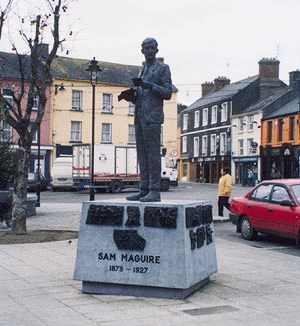
Sam Maguire's home-place ran into ruin after his death. His sister Moll stayed at the house where she nearly died of cold and hunger. Very few thought of her except a few stalwart friends of old. Finally she was persuaded to move into the town by the president of the local G.A.A. club who was a long-time friend of the family. How could this town forget and treat so badly their greatest hero? How could Ireland forget such a man and what he had done? His name is remembered nationally by the Sam Maguire Cup but the man is forgotten. He is also remembered by the naming of the local playing pitch in Dunmanway and by the memorial at his birthplace. Also in centre of he's hometime is a statue to this great man.